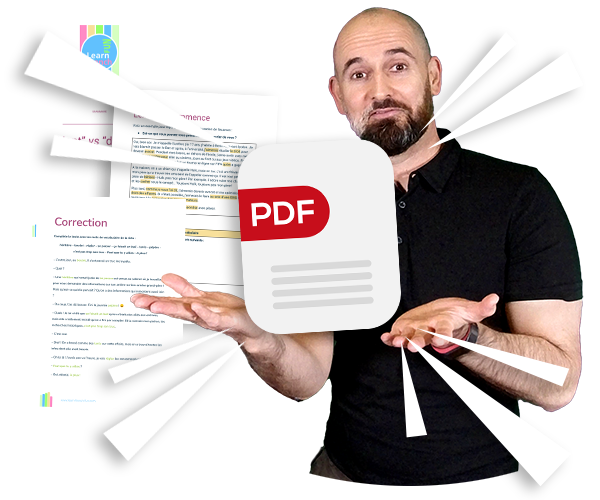I’m sure you sometimes have trouble understanding recent movies, TV shows or certain discussions between young people! No ?
I remember once I was young…
There are two main problems with this:
- Completely new vocabulary words
- Completely new vocabulary words
I know, the 2nd problem is the same as the first, but actually… not quite.

PDF Bonus
We have prepared a free PDF to help you understand and master the French slang VERLAN.
👉 Download it for free
At the end, you will have exercises to practice with the correction. 👍
The 1st point is clear. A lot of new words, or words that are already known but whose meaning changes, are going to be introduced into the language by the youth. I think this is the same in all languages.
There is no miracle, it is by listening, by understanding the context, by listening again that, little by little, you will understand them.
The second point is a little different. You hear a new word, you think it is new, but in fact you already know it! It’s just that the phonetic is completely different.
Don’t worry, there is a “certain” logic in this phonetics that is different.
Let’s see it together.
Do you like learning French with videos?
Receive our free video newsletter every Friday in your e-mail box. You will get 3 “Tips & Tricks” on grammar, vocabulary, phonetics or French culture.
👉👉 Sign up now!
What is “verlan” in French?
It’s slang, a spoken language, which consists in reversing the order of the syllables. “merci” becomes “cimer”.
Do you know what a syllable is? But yes, it’s a “linguistic unit”, something that is in between the phoneme and the word.
Okay, an example:
- Bonjour → 2 syllables: bon–jour.
- Bizarre (weird) → 3 syllables: bi–zar–re
Is that clear? Do you understand what a syllable is?
What about verlan? Well, verlan – as the name suggests – will reverse the syllables. In a way, you will speak backwards, in the other direction.
Oh?!?!? “Backwards” → l’envers in French… Verlan… l’envers-verlan. Do you understand?
But WHY ?????? Wasn’t the French language complicated enough?
It was necessary to speak it backwards ???
I know… Sorry…
An example of the use of verlan
Honestly, I can understand her! French fries are sacred, you don’t touch them 😀 😀
Tu touches à mes tefri je m’occupe de oit !
(You touch one of my fries, I’ll beat the shit out of you!)
- A “fry” (frite), in verlan becomes a “te–fri“.
- “You” (toi) becomes “oit“.
And so on… We reverse the pronunciation of the syllables.
Some rules with the verlan
- We don’t care about spelling at all (basically, it’s an oral language, don’t forget)
- No rigor on the number of syllables. In general, the open syllables, those ending with a vowel, are swallowed, we do not keep them.
The word “Bizarre”, in slang, is called “zarbi”.
- Short words that have only one syllable are still transformed: “Toi” → “oit”.
I told you… No rigor!
Odd for France, this lack of rigor, no? 😉
Do all French people speak “verlan”?
No, of course not, but all French people understand it – or almost all French people…
You’ll find it regularly in movies, in songs and even in literature.
If you want to discover it in writing, I recommend this book by Zerca, “Paname underground“, which received a literary award, the Prix de Flore, in 2017.
Can all French words be used in “verlan”?
Yes and no.
Next question? 😀
I told you, there is no linguistic rigor with verlan, it is a slang, a spoken language that is used in a certain context. So it’s not a rule that defines if a word can be used in verlan, but do people use this or that word in verlan!
Here a link to a dictionary that lists the most used slang words: https://www.dictionnaires.com/verlan/
Conclusion
So there you have it – verlan! Just like with any other language, it may take a little bit of practice to get the hang of speaking verlan fluently. But once you do, you’ll be able to communicate with the locals in no time! And who knows, maybe you’ll even start using verlan back at home too!
Ask your questions in comments below, I answer to everyone 😀
Articles that might interest you:
- French Vocabulary of Drinks
- 10 french idiomatic expressions with animals
- 10 French idioms related to music
- What English words are from French?
- French all-purpose words
- French vocabulary for the holidays
- Make his own French flashcards with vocabulary
- Some tips & tricks to enrich your French vocabulary
- 5 French idioms with everyday objects
- How to eat like a French person?




2 thoughts on “What is “verlan” in French? Do the French really use it?”
Comments are closed.